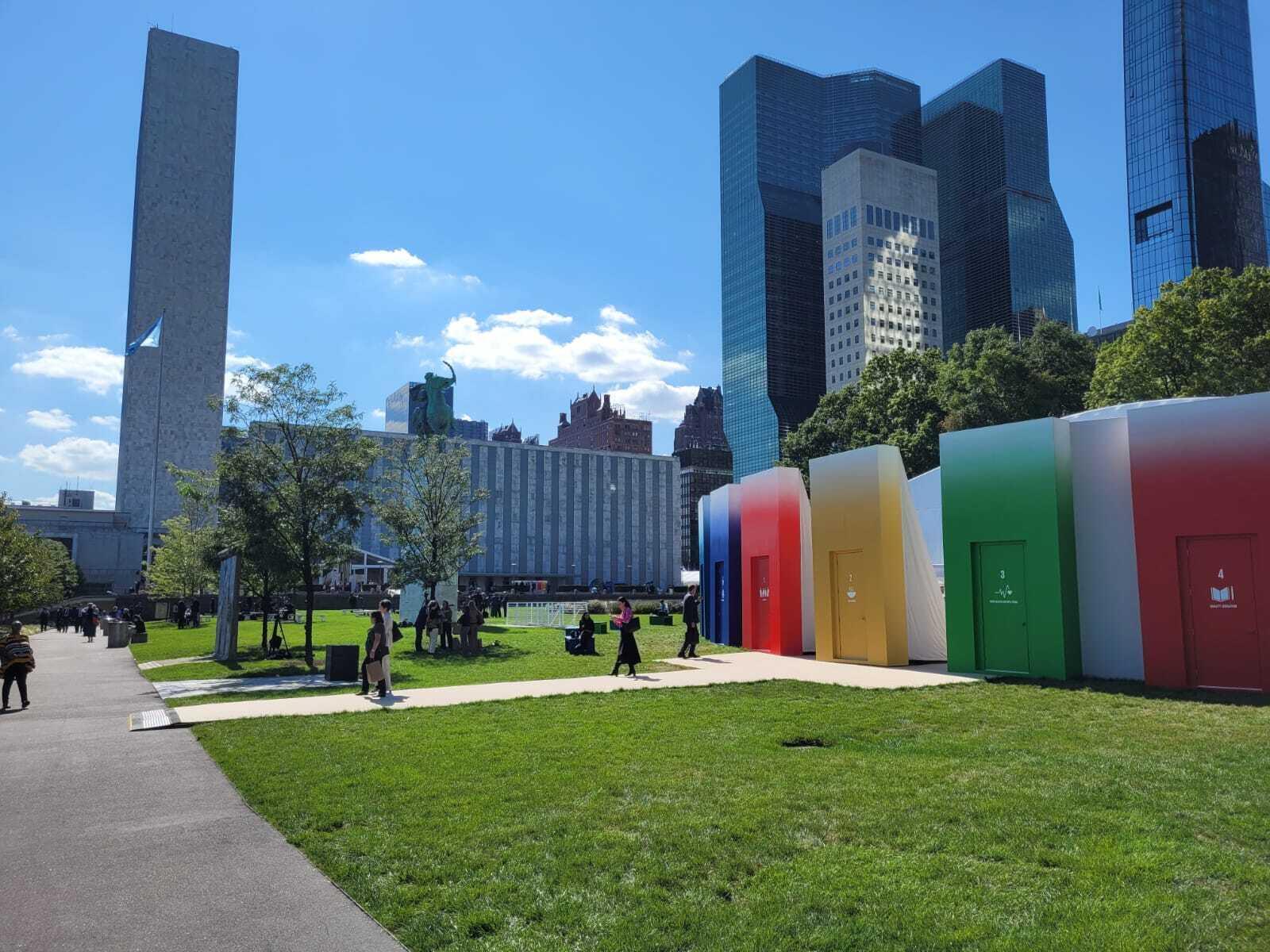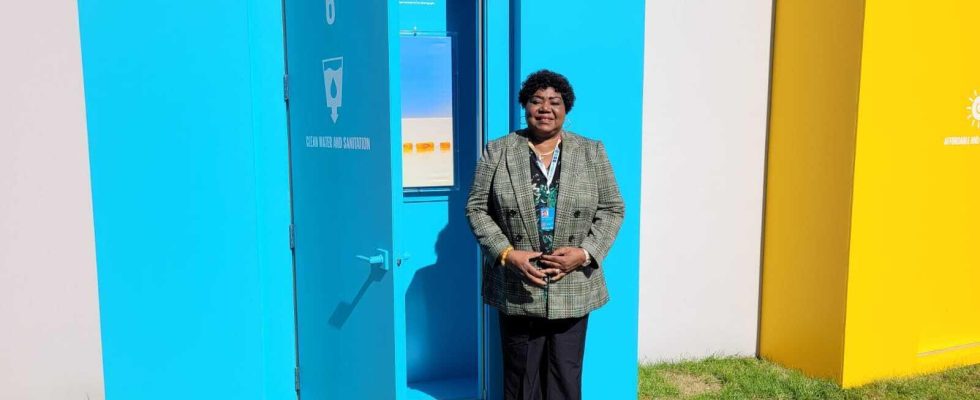During the United Nations General Assembly currently taking place in New York, Antonio Guterres called for “ help save the Sustainable Development Goals (SDGs) and fight for a better future that every individual deserves “. Among these 17 SDGs, the 6th aims to guarantee access to water and sanitation for all and ensure sustainable management of water resources, a crucial point for the African continent.
From our special correspondent in New York,
Water is at the heart of sustainable development and is essential for socio-economic development. It is also at the heart of adaptation to climate change. By 2023, more than half of the world’s population, or 4.2 billion people, lack safely managed sanitation services. Nearly 300,000 children under the age of 5 die each year from diseases caused by unsafe water and inadequate sanitation and hygiene practices.
On the African continent, three categories stand out. Countries experiencing droughts, those in the Sahel where there is not enough water to supply the entire population. Then come the countries which are very rich in water, which are mainly located in Central Africa. There, water is abundant but there are many systemic problems that prevent the supply of water to all populations. The last category of countries includes states where scarcity and abundance coexist, but with a lack of supply. “ What we see on almost the entire African continent is that there is almost no country that has universal access to drinking water. », Analyzes Balwant Godara, policy advisor to the global partnership of Sanitation and Water for All (SWA)*.
Read alsoGuinea: protest movements demand electricity and drinking water
This is the case in Ivory Coast, a country where water is abundant in certain areas but where inequalities in access are felt. “ We are capitalizing so that as many citizens as possible have access to water, and we are doing everything we can to achieve this. », Explains Hélène Bragori, director of rural sanitation at the Ivorian Ministry of Hydraulics, Sanitation and Health. Currently, 72% of the population of Côte d’Ivoire has access to water (more than 87% in urban areas and around 57% in rural areas), which makes this country an example in this area.
To achieve this, Abidjan has implemented numerous programs, the country works with Unicef, USAID (American Agency for International Development), the African Development Bank, the World Bank, etc. “ All this is motivated by the fact that the government has realized the importance of this issue and has decided to take charge of the problem of water and sanitation, insists Hélène Bragori. We also provide training to local stakeholders, such as masons so that they can build toilets up to standards. »And the manager recounts that in 2018, more than 6,000 public primary schools in rural areas did not have toilets. Today, sanitation facilities have been installed in more than 1,000 of them, and efforts continue.
Also listenWill it be possible to ensure universal access to drinking water in the Sahel and West Africa?
Because who says water also says sanitation. However, this element is still not sufficiently taken into account. Two reasons explain the difficulty in achieving this SDG by 2030: many countries place emphasis on drinking water but not enough on sanitation. Its crucial importance has not been understood. The second reason is logistical: in the private sector, water and sanitation are given little or no consideration because they are not profitable enough. Then development aid is also declining. “ The financial question, which is crucial, will be the big obstacle to achieving this SDG, adds the SWA political advisor. But it is nevertheless achievable in many West African countries where progress is continuing. » « SDG-6, we believe, is at the center of all the other SDGs. We cannot fight poverty when we do not have access to drinking water, we cannot talk about health without sanitation. SDG-6 is central and it will make it possible to achieve the other Development Goals », insists for her part the director of rural sanitation at the Ivorian Ministry of Hydraulics, Sanitation and Health.
Read alsoAmina Mohammed (UN): “We have 8 years left to keep our promises on the Sustainable Development Goals”
An element of emancipation for women
Water and sanitation are also a question of rights. Clean and private sanitation facilities are necessary, especially for women and girls to manage motherhood and menstruation with dignity and safety. Sanitation is therefore also a question of human dignity.
“ The question of drinking water always brings me back to a gender problem, explains Hélène Bragori with emotion. Water stress and hardship affect women, and especially little girls. When the water problem is resolved, girls will be able to go to school. The consequences on society are therefore enormous, and not just health-related. Imagine the dangers a woman faces when she has to go into the bush in the middle of the night to satisfy her needs… »
Is the water issue sufficiently considered at the global level?
Sanitation is therefore a central element of the SDGs. Its repercussions are also felt on climate change; for example, flooding in urban areas would be reduced if sanitation services were adequate. The argument is therefore multiple because it is economic, climatic, health, and an element of dignity.
In half a century, only two conferences on water have been held at the UN level. The second took place last March in New York. It ended with the adoption of an Action Program containing more than 700 commitments. “ The question of water is not like that of health, it is not “thematic” but absolutely transversal, notes Balwant Godara. It’s a question of natural resources, social services, public infrastructure. All development entities could thus have a link with water, directly or indirectly, hence the immense conceptual and methodological complexity. »
The issue of water is also crucial in conflicts on the African continent, such as those between farmers and pastoralists which are, for example, partly linked to water resources.
“ We are developing countries, we expect a lot on all these issuesconcludes the Ivorian official. Our populations expect a lot. We need funding in the face of all these climate changes. We must move towards sustainability. And we are optimistic. We have confidence. » A note of hope despite an observation that remains alarming: the Sustainable Development Goals adopted eight years ago by States around the world are not on track and need a global rescue plan, argued Monday UN Secretary-General António Guterres. This September 18, the leaders present at the UN adopted a Political Declaration underlining their collective commitment to building a sustainable, inclusive and prosperous world by 2030. The intentions are thus clearly there. It remains to apply them.

* SWA, which stands for “sanitation and water for all,” is a global partnership associated with the United Nations, with 350 voluntary partner entities, civil society, donors and development banks, private actors and 85 national governments.
